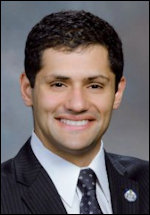This is what you get when the General Assembly usurps the State Corporation Commission and starts dictating energy policy. HB1635 by Del. Sam Rasoul, D-Roanoke, would impose a moratorium on “any new electric generating facility that generates fossil fuel energy through the combustion of any fossil fuel resources,” along with any fossil-fuel pipeline or export facility. The bill has been approved by the Committee on Commerce and Labor and is being considered by the full House.
Rasoul seems to be under the impression that it is possible for Virginia to transition to a 100% clean energy economy — in other words, one dominated by renewable energy sources such as solar, wind, and (a trivial contributor in Virginia) hydro. I don’t know what he thinks about nuclear, but if he agrees with the Sierra Club, he’s against that, too. The problem, as every reader of Bacon’s Rebellion knows, is that wind and solar are not dispatchable — that is, electric utilities cannot turn them on and off to meet fluctuations in demand.
As a practical matter, there only two ways to offset intermittent solar and wind production in Virginia: (1) by building natural gas-fired peaker plants, or (2) importing energy from outside the state. If you don’t build the peaker plants, demand will periodically exceed supply, leading to widespread blackouts and brownouts. If you import electricity from outside the state, it will be a mix of conventional and renewable, hence won’t be green, thus defeating the purpose of the legislation. Plus, it would require construction of a lot more high-power transmission lines, which, last time I checked, nobody likes.
In theory, it might be possible to build massive racks of batteries to store enough energy to meet electricity demand for relatively short periods of time. But even assuming the lithium-ion technology advances to the point where batteries are economically practical for load shifting, there isn’t enough lithium in the world to build enough batteries to carry Virginia through a prolonged extreme weather event like the Polar Vortex.
Environmentalists also argue that miraculous things can be accomplished through energy conservation. Yes, conservation can reduce the demand for electricity. But I have seen no evidence to suggest that conservation can offset both economic growth and the planned phase-out of old coal, biomass and natural gas plants, not to mention the phase-out of nuclear plants, as many advocate.
So, if Rasoul’s secret aim is to destroy the reliability of Virginia’s electric grid and plunge the economy into periodic chaos, then this bill is a good idea. Otherwise, it is a very bad idea. One might be able to make an intellectually respectable case for banning new fossil-fuel facilities if other appropriate measures — conservation, decentralized smart grids, etc. — were put into place. But banning fossil fuels without accompanying measures is a prescription for disaster.
It is remarkable to me that Rasoul’s bill received nine “yes” votes in committee compared to only seven “no” votes. (Six members of the committee did not vote.) The issue, driven by fear of global warming, is polarized along party lines — eight of the nine “yes” votes came from Democrats. (Del. Tim Hugo, R-Centreville, voted in favor in order to get the bill onto the floor, where, presumably, it will be defeated.) Six of seven “no” votes were Republicans. With the recent 4th District Court ruling on redistricting, it seems inevitable that Democrats will take control of the General Assembly in the next election. HB1635 may not make it through the legislature this year, but Rasoul will be back, and he’ll likely have a more ideologically compatible legislature behind him.



